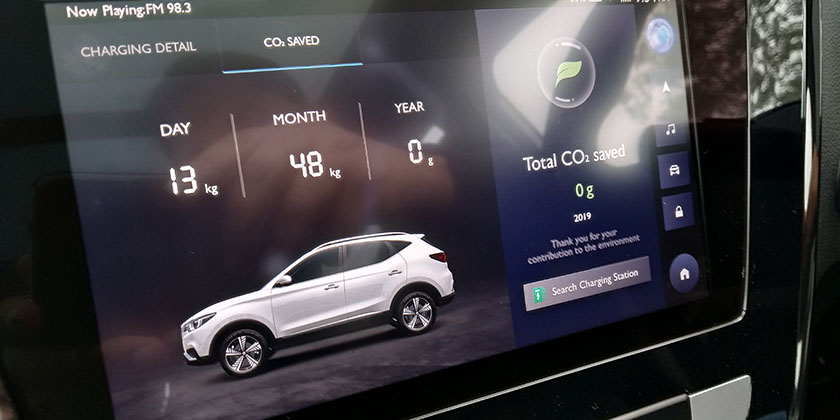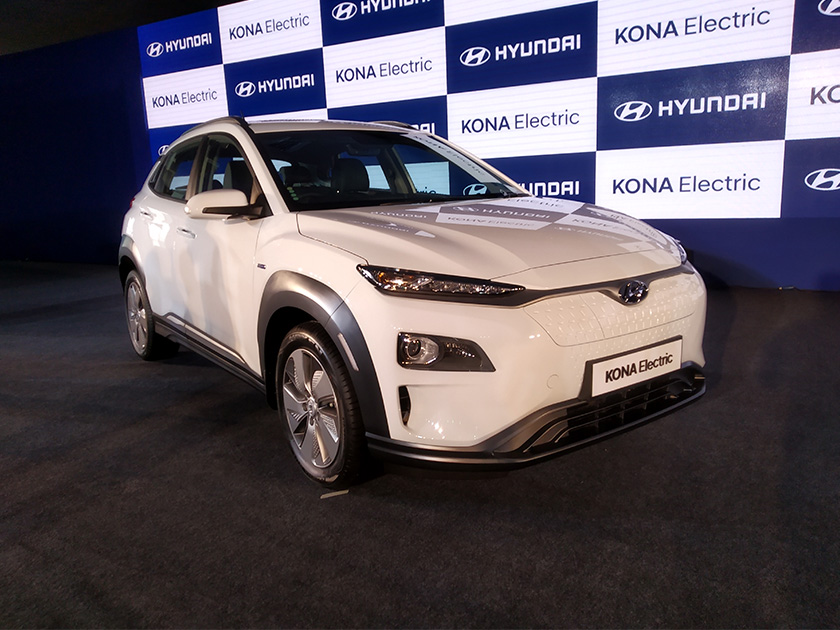Only electric cars can drive sustainable change. Or can they?
- From carbon emissions to charging stations, we clear the air around electric mobility

Girish Karkera is a car and bike nut who managed…
If you think electric cars is a modern phenomenon, think again. History has recorded the first instance of a cart propelled by an electric motor back to the mid 1800s. That was almost half a century before the first official “car” – a four-wheeler with an internal combustion engine (ICE) – broke cover. In fact, at the beginning of the 20th century, steam was still the leading power source in transportation followed by electricity and gasoline. While steam-powered vehicles were inherently cumbersome and big, electric vehicles soon grew in popularity thanks to their smaller size and were used a lot in the Western world.
Eventually, what caused the decline of electric automobiles was the same problem it faces even now – range. As the road network increased and people started exploring long-distance journeys, the Achilles Heel of electric cars got exposed. In comparison, gasoline-powered cars emerged as a much more practical option. With petroleum being discovered around the world, it became even cheaper to run. Engineers managed to exploit the inherent aural character of ICE in terms of enthralling exhaust notes that along with the visuals of a car only helped enhance its emotional appeal.
History has recorded the first instance of a cart propelled by an electric motor back to the mid 1800’s
The last time electric cars made a resurgence was in the 1960s. But the reason was not environmental but more as an alternative power source as the fuel crisis had struck the world for the first time. But once again, as the crisis ended so did the interest in electrics until global warming raised its head. For over three decades now, environmentalists have been crying hoarse at the impending doom of our planet unless we do something large scale about the disappearance of our green cover and increased levels of greenhouse gases in our air. It is no secret that ICE is a significant producer of the latter – CO2, carbon particulate matter and Nitrous Oxide especially given the number of them operating around the world. A conservative estimate from a few years ago pegged this number at over 100 crores! If you include two-wheelers, the number could be twice as much. Of course, cars alone cannot be deemed the culprits harming our planet but there is no running away from the fact that it is turning out to be one. Also the one for which there seems to be a solution.
Internal combustion engine (ICE) is a significant producer of CO2, carbon particulate matter and Nitrous Oxide

Car and bike makers tried hard over the years to reduce the amount of emissions from them. A modern car or bike spews a substantial lesser amount of these harmful chemicals from its exhausts than say its predecessors did even as much as a decade ago. However, it is emerging that it is not enough given the accelerated deterioration of our planet’s environment. Cars have become the poster bad boy squarely because they are the most obvious polluters and easily spotted. But cars are also a way of life for humanity now. So they possibly can’t be done away with. Enter electric cars, once more.
But are electric cars flawless?
Electric vehicles have their own pros and cons. The most obvious advantage is of course zero emissions. Drawing power from a battery to run the motor means no physical burning of fuel which is the core of an internal combustion engine. The inherent construction of electric cars reduces the amount of moving parts in the engine bay area and overall in the car. Fewer moving parts mean lesser chance of something breaking due to wear and tear. This also means lesser maintenance costs. The other big advantage is the actual running cost. We all know fuel prices have gone through the roof in the last decade or so. In comparison, a full-sized electric car runs at as less as Rs 1 per kilometer. That’s 10 per cent of an average fossil-fueled car. The accountants would be nodding in collective agreement on this. Plus these cars are quiet in the process helping with reducing noise pollution too – important for those who are always on the road for their livelihoods.
A full-sized electric car runs at as less as Rs 1 per kilometer. That’s 10 per cent of an average fossil-fueled car

Then there are the disadvantages. One of the biggest is the source of power which will be sued to charge these millions of cars of the future. Generation of electricity is still done at a lot of countries through burning coal. Will increased need for charging a billion vehicles also mean burning more coal? That would defeat the purpose because what is not coming from the cars’ exhausts will be reaching our air at the power plant level. Nuclear power is also not finding much favour thanks to the core dangers they pose. We are yet to scale up clean energy solutions such as solar, windmills and even hydro power. The race is on and many countries are trying to reach a point where these would be a complete replacement to otherwise harmful energy production processes.
The other major disadvantage is the range and charging time of current cars. On an average new electric cars have shown to have a range of 300-400 km at best although there are certain car companies such as Tesla which boast of more. They aren’t cheap to buy though and of course not freely available yet. Last year, India saw the arrival of its first production long-range electric car – Hyundai Kona (claimed range of 430km). Electric cars aren’t new to India. Maini Electric, a Bangalore-based firm, was the first to launch a production-ready car in India more than two decades ago. Christened Reva, it turned out to be a too niche accommodating only two passengers and a range of roughly 50-60km. This relegated it mostly to areas in Bangalore where tech support was also easily available. Mahindra bought over the company and revamped Reva making is bigger and more practical (new name e2o) with a better 100km range. But even this was a hard sell making the company rethink their strategy. After dabbling with electric version of its regular cars such as Vibe and Verito which did not meet with much success, the company is now starting from a clean slate and working on an all-new range of cars. But that’s in the future. In the first two months of 2020 alone, India will see the launch of many electric cars such as MG ZS EV, which has a claimed 340km range, Tata Nexon EV (estimated 300km range) and India’s first full-electric luxury car – Audi e-tron. Maruti is also working on an electric version of its popular small car WagonR. Obviously they all want first-mover advantage as electrics are clearly seen as the immediate future when it comes to cleaner alternatives in the absence of anything else that would equally effective and relatively affordable.

On an average new electric cars have shown to have a range of 300-400 kms but there are certain car companies such as Tesla which boast of more
Not so long ago, it looked like some government departments and institution, were keen on pushing an all-electric agenda for Indian automotive industry in the near future if not immediately. While the intentions were noble, the absence of any long term plan on how it would be executed created enough confusion. It is now said to be working on a more practical roll out plan. How practical? That remains to be seen.
Most car companies assure at least an 80% charge in less than an hour but this still doesn’t compare to the ease of a regular fuel refill

In some western countries, governments are promoting the use of electric cars through tax sops and everyday conveniences such as free parking bays. The Delhi government has recently rolled out a similar strategy. Of course, that’s very local. Setting up charging infrastructure will be, looks like, mostly left to private players to build. Many companies are working towards it. Typically, a lot of cars companies such as Hyundai and MG have tied up with individual players to set-up this infrastructure for its customers. Tata Motors has given the mandate of setting up 300 charging stations to its group company Tata Power while standalone firms such as Magenta are doing it individually along certain prime corridors such as Mumbai-Pune Expressway.
While range on a full charge is something that manufacturers are continuously working on, battery and charging technology are trying hard to keep up with the frantic pace of customers need. With range of cars increasing by the day the biggest concern for would-be car owners is the charge time and charging infrastructure. While most car companies assure at least an 80% charge in less than an hour (if you can bring the car to a dedicated Direct Current charging station) this waiting time still doesn’t compare to the couple of minutes which is all that you may spend at a fuel pump for a full tank. The regular AC chargers, which companies are currently providing to every customer of an electric car, still takes anywhere between 6-8 hours for a full recharge. Accepting this warrants a lifestyle change and that needs some serious conviction to get used to. As we strive towards zero emission – which is the need of the hour – electric cars seem to be our most obvious, if not the only, bet. It took some time – almost two centuries since the first one – to arrive for good but it looks like the time of electric cars is finally here.
Girish Karkera is a car and bike nut who managed to carve a living out of his passion. In a career spanning 22 years as a journalist, he has spent most of it following the mobility industry and evaluating newly-launched automobiles.







